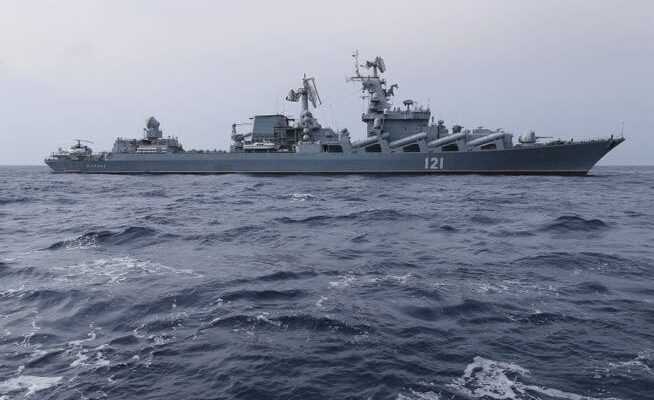Russia has shelled a factory near Kyiv that produces the missiles said to have sunk the cruiser Moskva. The sinking of the flagship could serve as an excuse for the Kremlin to officially declare war on Ukraine.
The “Moskva” in December 2015 in the Mediterranean Sea off the Syrian coast.
Sirens rang out in Kyiv and Lviv on Saturday morning. A little later, the Russian Ministry of Defense announced that several air-to-surface missiles had hit a weapons factory on the outskirts of Kyiv. According to local journalists, a factory producing armored vehicles was bombed. In the western Ukrainian city of Lviv, residents also heard explosions and planes overhead on Saturday morning. Shortly thereafter, the city administration reported the impact of several rockets.
The Defense Ministry in Moscow announced on Friday that it had bombed a missile production plant on the outskirts of Kyiv. It may have been in retaliation for the sinking of the Russian cruiser Moskva. Russia continues to insist that the flagship of the Black Sea Fleet sank due to a fire on board. However, there are increasing indications that it was hit on Wednesday by the very rockets produced in the Kyiv factory.
As early as Thursday, representatives of Ukraine stated that two of the newly developed Neptun missiles had hit the warship. Pentagon officials confirmed this account on Friday. According to that Lithuanian Defense Minister Arvydas Anusauskas the cruiser sent an SOS message on Thursday night. At around 1.14 a.m. the ship lay on its side and a little later all the electricity on board failed.
Warning of retaliation for the “Moskva”
A Ukrainian army spokeswoman, Natalia Humeniuk, issued a warning on Friday from Russian retaliatory attacks for the sinking of the “Moskva”. It is unclear how many of the more than 500 crew members of the guided missile cruiser were able to get to safety in stormy seas. The Russian news agency Tass initially reported that the entire crew was able to leave the ship. She later deleted the word “entire” in the message.
While some Russian journalists and politicians downplayed the significance of the aging cruiser’s sinking, others called for a harsh response. The government in Moscow threatened Kyiv on Friday with an escalation of the attacks, should there be more Ukrainian terrorist attacks and acts of sabotage on Russian territory. Moscow had previously accused Ukraine of using helicopters to attack several villages on the Russian side of the border.
Lithuania’s Defense Minister Anusauskas wrote on Facebook that Russia could use the sinking of the Moscow River as an excuse to officially declare war on Ukraine. So far, President Vladimir Putin has insisted that this is not a war but a “special military operation”. A declaration of war on the neighboring country would allow the Kremlin to announce a general mobilization in Russia.
Official arms shipment warning
The Kremlin also seems increasingly concerned about Western arms sales to Ukraine. As American media reported on Friday, Russia sent an official protest note to Washington on Tuesday. In it, the Kremlin warned of “unforeseeable consequences” if the United States continued to supply weapons. Despite this, President Joe Biden announced on Wednesday an increase in military aid by $800 million.
For weeks, Kyiv has been urging the West to supply heavy weapons and anti-ship missiles to keep the Russian Navy at bay. However, many NATO countries have so far hesitated to deliver tanks, artillery or helicopters because Moscow could see this as direct participation in the war. Russian Deputy Foreign Minister Sergei Riabkov warned on Friday that Russia will consider NATO vehicles transporting weapons to Ukraine as legitimate targets.
Despite such warnings, Slovakia last week by train S-300 anti-aircraft batteries to Ukraine delivered. Russia then claimed that it promptly destroyed the missiles in a storage facility near Dnipro. Kyiv denied this. In exchange for the Soviet missiles being handed over to Ukraine, Slovakia will receive Patriot batteries from Germany and other NATO countries. German Chancellor Olaf Scholz, who has been criticized for his hesitant attitude, also announced that Germany would provide Ukraine with EUR 1 billion for arms purchases.
